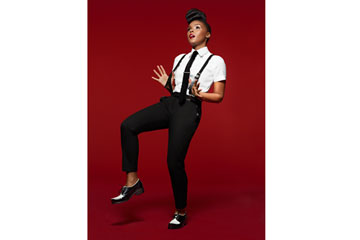
"A TIME interview is right up my alley," Janelle Monáe says as she enters the room. "You know, I consider myself a time traveler."
She unhooks her pair of glossy black sunglasses and throws a look over the frames. Then she laughs, softly, her neon yellow fingernails fluttering against her signature black-and-white tuxedo.
She's not kidding. Monáe, 27, is well known for her 2010 smash "Tightrope," a funk workout with ukuleles and a dance-party video set in a supernatural insane asylum. She might be even better known for her hair, a Morrissey--via--Grace Jones antigravitational wonder, seen in its full glory in ads for CoverGirl and Target, or for her brief vocal on Fun's 2012 energy drink of a single "We Are Young."
But her new album, The Electric Lady (releases Sept. 10), proves that Monáe is further out than all that. For one thing, it brought her the opportunity to produce Prince, who appears on Lady alongside Erykah Badu, Esperanza Spalding, Solange and Miguel. "Janelle and Eye go way back," Prince says in an e-mail. "It's obvious she is smarter than all of us."
More than that, with Lady she continues to wrap her music in an elaborate sci-fi framework, conceiving her various explorations of R&B, folk, gospel, Broadway, glam rock and meta-genre songs as connected chapters or suites of a single cosmic saga. Lady carries the tale forward to Suites IV and V, which, as it happens, are flashbacks to times before Suite I, her first EP. Oh, and there are also the intermillennial, interspecies communiqués from androids that Monááe says she receives via dreams. But more on that later.
Right now, Monáe arranges herself on a couch as she explains how it all began in Kansas. Born Janelle Monáe Robinson, with 50 first cousins in her working-class Kansas City family, she says, "I grew up just like Dorothy. I mean, I had the red ruby slippers and everything. Except mine were purple." She laughs. "Oh, I had some orange ones too."
It wasn't all Technicolor, though. She digs through her phone for a photo: it's young Monáe in high-waisted black pants, white shirt and suspenders. The outfit is identical to the one she wears today. "I sat my parents down and let them know what I wanted to do for the rest of my life," she says. And like her black-and-white aesthetic, "it never changed."
Her mom drove her around the talent-show circuit, making the most of what they could find. "Kansas had some of the most amazing artists. There just weren't resources for them." She escaped to New York City, attending the prestigious American Musical and Dramatic Academy, before moving to Atlanta, where, she says, "I lived in a boardinghouse with six different girls. And then I made my first CD, going around the dorm lounges at Spelman and Morehouse and Clark, just sitting on their couches and singing songs with my guitar." She got fired from a day job at Office Depot for spending too much time on her website talking to fans, who would "knock on my boardinghouse door and buy a CD for $5. And if I wasn't home, my roommates would sell them. I felt like I could do that for the rest of my life. That was success to me."
